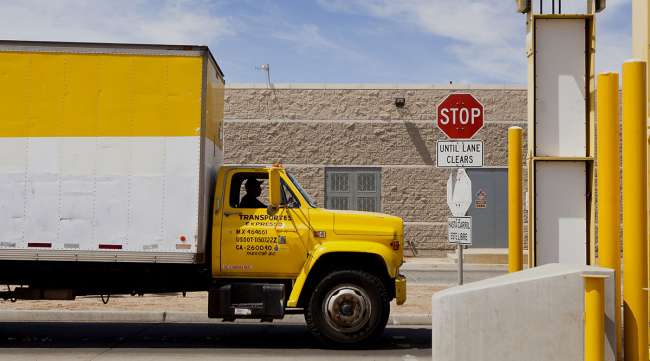Democrats Try to Smooth Trade Deal Passage With Labor Proposal

Two top Senate Democrats, including longtime free-trade foe Sherrod Brown are crafting a labor enforcement proposal that could help ease the way for passage of President Donald Trump’s new North American trade agreement.
Brown of Ohio and Ron Wyden of Oregon are floating ideas to address Democrats’ concerns about the U.S.-Mexico-Canada Agreement and build a consensus that could help get it through the Democratic-controlled House. The proposals include measures that would bar Mexican exporters from benefiting from the deal’s reduced tariffs if they violate workers’ collective-bargaining rights.
“The Wyden-Brown proposal is a positive sign that Democrats are looking at the USMCA agreement seriously and trying to find ways to get to ‘yes’ on it,” said Bill Reinsch, a senior adviser at the Washington-based Center for Strategic and International Studies.
Passing the USMCA will be an uphill battle in Washington’s politically toxic environment, where congressional Democrats often clash with Trump, especially as the 2020 election draws closer. Further, Trump’s repeated threat to close the U.S. border with Mexico and impose tariffs on Mexican car imports is worrying members of his own party.
Trade is critical for #ag producers in Oklahoma & the U.S., as we produce more commodities than Americans can consume. On Capitol Hill this week, @RepFrankLucas said it’s vital for USMCA to be ratified by Congress so that trade negotiations w/ Europe & China can be finalized. pic.twitter.com/sWIyvAUcWW — Oklahoma Farm Bureau (@okfarmbureau) April 5, 2019
The White House wants Congress to approve the USMCA before a monthlong August recess, but lawmakers have flagged a number of issues they say need to be addressed first. Those items include labor and enforcement rules, environmental standards and a provision on pharmaceuticals that Democrats fear will lead to higher drug prices.
“I’m hopeful that we could get a trade agreement, but it has to be one that is real and that works,” House Speaker Nancy Pelosi told reporters April 4. On the matter of workers’ rights, she added that “exploiting workers in Mexico is not good for workers in the United States.”
The Brown-Wyden framework borrows from existing provisions in U.S. trade agreements on matters including Peruvian timber exports and imports of textiles and clothing. It would require additional Mexican labor enforcement personnel and would create some U.S.-Mexican labor compliance initiatives. Also, the U.S. and Mexican governments could audit and inspect facilities suspected of violating the trade deal’s labor standards. If a certain facility wasn’t complying, goods made there wouldn’t get duty-free treatment.
The proposal would be negotiated as a side agreement that’s incorporated into the main text of the deal and wouldn’t require reopening the broader agreement.
Aides for Brown and Wyden said the plan is subject to revision, including which industries could be affected by labor law inspections. They said it hasn’t been discussed with Senate Finance Committee Chairman Chuck Grassley (R-Iowa). But the model being based on precedent could help win support from Mexico, Republican lawmakers and House Democrats, the aides said.

U.S. Trade Representative Robert Lighthizer (Andrew Harrer/Bloomberg News)
The Trump administration is aware of the proposal, and Brown presented it to U.S. Trade Representative Robert Lighthizer a year ago, one of the aides said. Asked whether the administration supports the effort, the aides deferred to Lighthizer’s office. A spokesman there didn’t respond to a request for comment.
Pelosi spokesman Henry Connelly said House Democrats also are involved in the talks.
“House and Senate Democrats have a shared interest in ensuring that Mexico fully implements the promised changes to its labor regime,” Connelly said. “We’re engaging with key stakeholders and members on both sides of the Capitol, looking at a number of avenues to make sure the proposed agreement lives up to Democrats’ standards.”
Wyden is the top Democrat on the Senate Finance Committee, which has jurisdiction over trade. And Brown’s decision to try to improve the USMCA rather than fight it is a positive sign, given his reputation as a critic of past trade deals he says hurt American workers. If he decides to back the agreement, he could provide political cover to other Democrats in both chambers to vote yes.
Brown has long opposed the North American Free Trade Agreement and other trade deals. On trade he’s found a rare alliance with Trump, even backing the president’s levies on steel and aluminum imports from Mexico, Canada and the European Union. Brown took Trump’s side on trade in 2018 while successfully campaigning for a third Senate term in Ohio, a manufacturing state battered by decades of job losses. Trump carried Ohio by 8 percentage points in the 2016 election.
Even if the labor framework were adopted, there’s no guarantee that Brown would support the trade agreement because there are many moving pieces in the trade discussion, an aide to the senator said.




